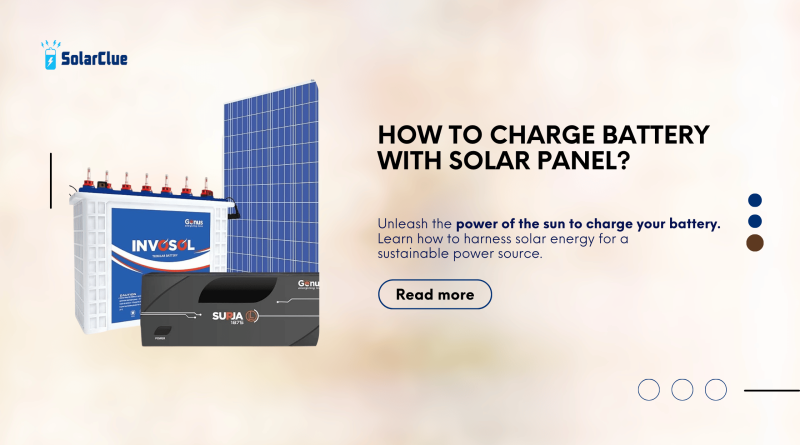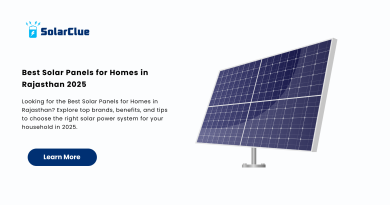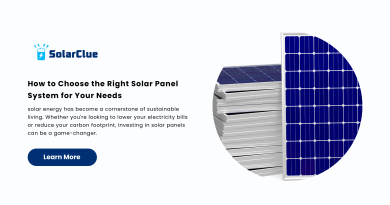How To Charge Battery With Solar Panel?
Harnessing solar energy to charge batteries is a sustainable and cost-effective way to power your devices and appliances. This blog will delve into the How To Charge Battery With Solar Panel, different types of batteries suitable for solar charging, how to size your solar panel system, the role of charge controllers, and essential safety precautions. Whether you’re setting up an off-grid system or simply want a reliable backup power source, understanding these components is crucial.
Table of Contents
Types of Batteries for Solar Charging
1. Lead-Acid Batteries
Lead-acid batteries are the most commonly used batteries in solar power systems. They are cost-effective and reliable, making them a popular choice for both residential and commercial applications. There are two main types of lead-acid batteries:
a. Flooded Lead-Acid Batteries: Require regular maintenance and water refilling.
b. Sealed Lead-Acid Batteries (AGM and Gel): Maintenance-free and less prone to leakage.
2. Lithium-Ion Batteries
Lithium-ion batteries are known for their high energy density, long lifespan, and efficiency. They are more expensive upfront but offer better performance and a longer cycle life than lead-acid batteries. They are ideal for applications where space and weight are concerns, such as in electric vehicles and portable solar systems.
3. Nickel-Cadmium Batteries
Nickel-cadmium batteries are less common in solar applications but are known for their durability and ability to perform well in extreme temperatures. They are more expensive and have a lower energy density compared to lithium-ion batteries.
Sizing Your Solar Panel System
Calculating Energy Needs
To size your solar panel system correctly, you need to determine your energy needs. Calculate the total watt-hours (Wh) your battery system needs to store and supply. This can be done by listing all the devices you plan to power, their wattage, and the number of hours you use them per day.
Choosing the Right Solar Panels
Once you know your energy needs, you can select the appropriate solar panels. Consider the following factors:
- Wattage: The power output of the panels.
- Efficiency: Higher efficiency panels generate more power in less space.
- Durability: Panels should withstand environmental conditions in your area.
Charge Controllers
PWM Charge Controllers
Pulse Width Modulation (PWM) controllers are cost-effective and commonly used in smaller solar systems. They work by reducing the voltage coming from the solar panels to match the battery’s voltage.
MPPT Charge Controllers
Maximum Power Point Tracking (MPPT) controllers are more efficient and suitable for larger systems. They optimize the power output from the solar panels by adjusting the voltage to ensure the battery charges efficiently.
Safety Precautions
Charging batteries with solar panels involves handling electricity, so safety is paramount. Follow these precautions:
1. Proper Installation: Ensure all components are installed correctly and securely.
2. Use Appropriate Fuses and Circuit Breakers: Protect your system from overcurrent and short circuits.
3. Regular Maintenance: Check connections and clean your panels regularly to maintain efficiency.
4. Avoid Overcharging and Deep Discharging: Use a charge controller to prevent battery damage.
| Battery Type | Charging Efficiency | Lifespan (Cycles) | Maintenance Requirements | Cost |
| Lead-Acid | Moderate | 500-1000 | Regular (Flooded) / Minimal (Sealed) | Low to Moderate |
| Lithium-Ion | High | 2000-5000 | Minimal | High |
| Nickel-Cadmium | Moderate | 1500-2000 | Minimal | Moderate to High |
Conclusion
Charging your batteries with solar energy is an effective way to harness renewable power and ensure a reliable energy supply. By understanding the different types of batteries, sizing your solar panel system correctly, using the right charge controllers, and following safety precautions, you can optimize your solar battery charging setup. Explore the internal and external resources provided to deepen your knowledge and make informed decisions about your solar energy system.
Here at SolarClue®, we offer a smart, practical, and “beautiful” solution. You will be answered for all the questions related to Solar.
We provide all kinds of brands that are the Best Solar panels in India.
If you are the one who is planning for the solar power system. Don’t hesitate to contact our team!
Looking forward to empowering you with solar energy, just like hundreds of our other clients!
FAQs
Q1: Can I charge any type of battery with solar panels?
A: While most batteries can be charged with solar panels, it’s essential to use a suitable charge controller and follow the manufacturer’s guidelines for optimal performance and safety.
Q2: How do I choose the right size solar panel for my battery?
A: Calculate your energy needs in watt-hours and select solar panels with sufficient wattage and efficiency to meet those needs.
Q3: What is the difference between PWM and MPPT charge controllers?
A: PWM controllers are cost-effective and suitable for smaller systems, while MPPT controllers are more efficient and ideal for larger systems, as they optimize power output.
Q4: How often should I perform maintenance on my solar panel system?
A: Regular maintenance should be performed at least twice a year, including checking connections, cleaning panels, and inspecting for any signs of wear or damage.
Q5: What are the benefits of using lithium-ion batteries over lead-acid batteries?
A: Lithium-ion batteries offer higher energy density, longer lifespan, and greater efficiency, though they come at a higher initial cost.




